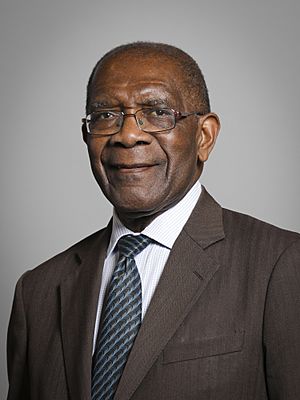Bill Morris, Baron Morris of Handsworth facts for kids
Quick facts for kids
The Lord Morris of Handsworth
OJ DL
|
|
|---|---|
 |
|
| Member of the House of Lords Lord Temporal |
|
| In office 7 June 2006 – 21 July 2020 Life peerage |
|
| General Secretary of the Transport and General Workers' Union | |
| In office 1992–2003 |
|
| Deputy General Secretary of the Transport and General Workers' Union | |
| In office 1986–1992 |
|
| Personal details | |
| Born |
William Manuel Morris
19 October 1938 (age 87) Manchester Parish, Jamaica |
| Nationality | British |
| Occupation | legislator, appointee to various quangos |
| Known for | first black leader of a British trade union |
William Manuel Morris, also known as Baron Morris of Handsworth, is a well-known British leader. He was born on October 19, 1938. He is famous for being the first black leader of a major trade union in Britain. A trade union is a group that helps workers get fair pay and good working conditions.
From 1992 to 2003, he was the General Secretary of the Transport and General Workers' Union. This was a very important job. Later, from 2006 to 2020, he was a member of the House of Lords. This is part of the UK Parliament, where he helped make laws.
Contents
Early Life and Family
William Morris, often called Bill, was born in Manchester Parish, Jamaica. When he was young, his father, William, passed away. His mother, Una, then moved to England to find work. She settled in Handsworth, a part of Birmingham.
In 1954, Bill Morris joined his mother in the UK. He found a job at a company that made car parts called Hardy Spicer Engineering Ltd. In 1957, he married Minetta. They had two sons together. Minetta passed away in 1990.
Working for Workers: Trade Union Career
Bill Morris started his journey in the Transport and General Workers' Union (TGWU) in 1958. By 1962, he became a shop steward. A shop steward is a worker chosen by their colleagues to represent them and help solve problems with their employer.
After serving on the union's main council, Bill Morris became a full-time union official in 1973. He worked in different areas, helping bus and coach company staff. In 1985, he became the Deputy General Secretary.
Leading the Union
In 1992, Bill Morris was chosen to be the General Secretary of the TGWU. This meant he was in charge of the whole union. He was re-elected in 1995. He stayed in this important role until he retired on his 65th birthday in 2003.
Other Important Roles
Besides his union work, Bill Morris held many other significant positions.
- He was part of the TUC General Council, which is a big group representing many unions.
- He was a director at the Bank of England, helping with important financial decisions.
- He also advised the BBC and IBA on broadcasting.
- He was a Commissioner for the Commission for Racial Equality, working to make sure everyone is treated fairly.
- He led an investigation called the Morris Inquiry into police standards.
- He is a supporter of the Refugee Council, an organization that helps refugees.
- He also serves as a director for the England and Wales Cricket Board.
Helping Universities
Bill Morris has also been involved in education.
- He was a member of the Board of Governors for London South Bank University.
- He was a Trustee for the Open University Foundation.
- He helped lead the University of Northampton and the University of Bedfordshire.
- In 1999, he became the first Chancellor of the University of Technology, Jamaica.
- He also became Chancellor of Staffordshire University in 2004.
Becoming a Lord: House of Lords
Bill Morris received special honors for his work. In 2002, he was given the Order of Jamaica. In 2003, he received a knighthood from the Queen.
In 2006, it was announced that Bill Morris would join the House of Lords. He became a "life peer," which means he was given the title of Baron Morris of Handsworth for the rest of his life. In the House of Lords, he worked on the Parliamentary Joint Committee on Human Rights, which helps protect people's basic rights.
In 2014, he was one of many public figures who signed a letter against Scottish independence. He retired from the House of Lords on July 21, 2020.

